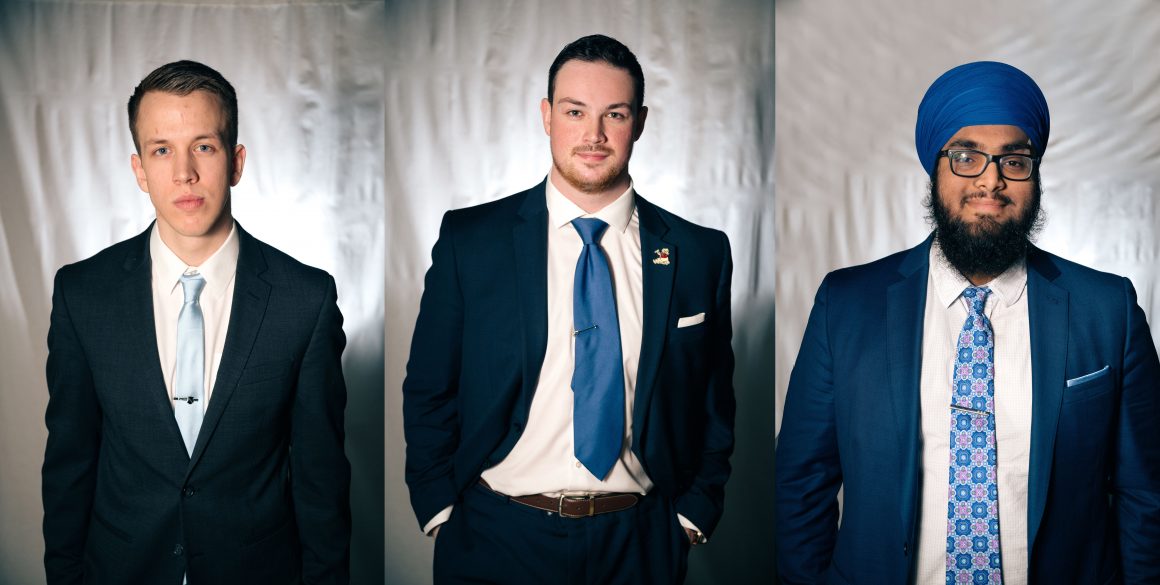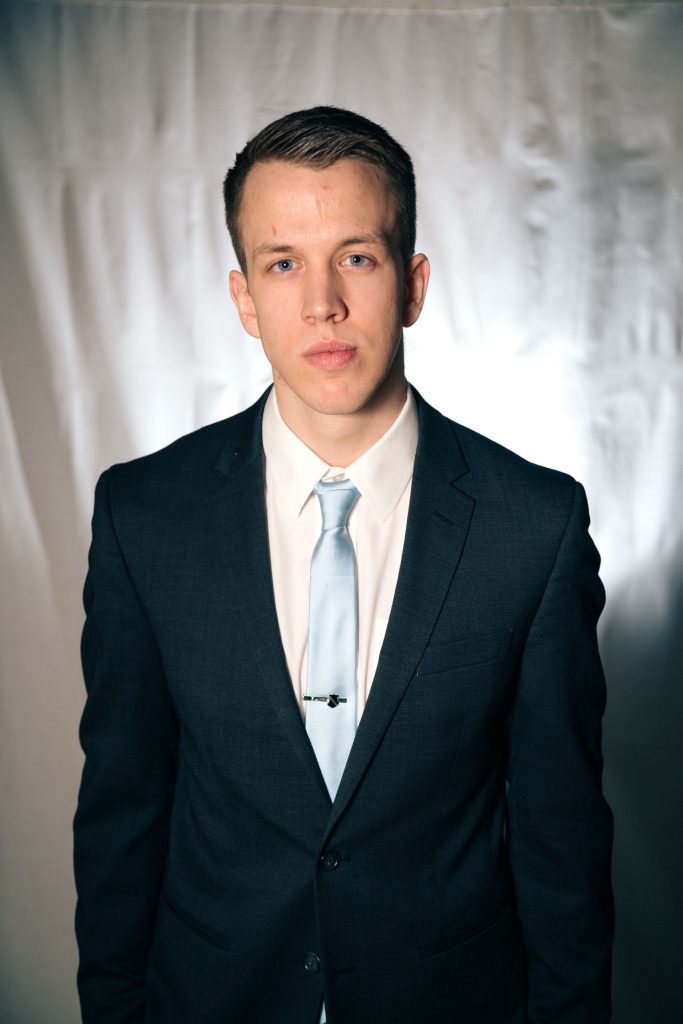
SU election supplement 2017: president
[dropcap style=”inverse”]E[/dropcap]very year during reading week, the Gauntlet puts together our Students’ Union election supplement to inform students on who is running, what they plan to do if elected and who we think is best for the job.
We invite all candidates vying for executive positions to our office — after the one time every year that we actually clean it — for a five-minute platform pitch and a 10-minute question and answer session. A panel of Gauntlet staff picks apart the platforms and grills candidates on some of the key issues they would face if elected.
Last year, the MacHall ownership dispute between the SU and the University of Calgary demonstrated the need for strong student government. The dispute — and the ensuing lawsuit — was inherited by this year’s Students’ Legislative Council and will be passed on to whomever is elected this March. The failure of the injunction application this year and the resulting loss of control over roughly $1.9 million in MacHall-based revenue puts the incoming SLC in a difficult position. U of C students need competent student leaders now more than ever to address the MacHall ownership issue and work in the interest of students.
We know the election period can be annoying. Posters cover every possible inch of wall space and costumed candidates invade your classes to beg for votes. Student elections can seem juvenile and meaningless, but their outcomes are still significant. The SU’s decisions and policies affect the student body as a whole, whether it’s fighting for tuition fee regulation or keeping country music out of Bermuda Shorts Day. It is crucial we elect capable officials who have our best interests at heart.
Since you can’t properly judge a candidate on an outdated meme poster or a 90-second classroom pitch, the Gauntlet is here to inform you of the candidates’ qualifications and platforms. Once you’ve read our reviews, look for our panel’s endorsements on the last page. These are the candidates we feel would do the best job if elected based on their interview, platform and previous experience. But don’t just take our word for it. Every candidate’s platform is on the SU website, and most candidates make themselves available during the campaign period if you have any questions.
And of course, don’t forget to vote March 7-9. You can vote online through your student centre or in person via ballot boxes in MacHall.
President
[hr gap=”15″]
The president is the leader of the Students’ Union. They have the most flexible portfolio, but are generally in charge of setting the direction of the organization. They also maintain official relations with the university, oversee the work of Students’ Legislative Council and vote on the Board of Governors. Look for an assured, pragmatic candidate who is aware of the challenges facing the SU.
Branden Cave
In his opening pitch to us, Branden Cave said that he wanted University of Calgary students in 25 years to look back on his year as Students’ Union president as “a turning point for students on campus.” But consisting of mostly obvious points, Cave’s platform doesn’t exactly promise sweeping change.
That being said, with a year of SU executive experience already under his belt, Cave is a conservative, safe and responsible choice for SU president.

“I know how to lead student organizations and make an impact that lasts just beyond the year that I’m in office.”
Having served this year as vice-president operations and finance, Cave has the most sophisticated understanding of the MacHall dispute among the three candidates. Cave says he spent the past year developing positive relationships with university administration and is confident that a return to the negotiating table would result in a verdict that benefits students. While not a flashy approach, Cave’s strategy prioritizes a quick resolution in order to move on with future redevelopment of the building.
Many of Cave’s other priorities are fairly obvious. His ideas about the upcoming Calgary municipal election fall more under the portfolio of the vice-president external, but it’s nice to see that he’s on board with bringing the election to campus. And prioritizing student space during campus redevelopment is always a good thing.
His weakest platform point is his “President’s Consultative Task Force.” Cave is convinced he’ll be able to showcase direct student voices, but we have trouble believing it won’t be anything more than another unproductive cog in the SU’s bureaucracy. Cave says he will focus on recruiting a variety of students to the task force, but it’s incredibly difficult to get uninterested student involved with the SU. We elect our student representatives for students to have a direct voice in student government. It’s hard to justify adding yet another appointed committee.
As vice-president operations and finance, Cave carried himself extremely professionally and is responsible to a fault. While he would make an incredibly competent leader of the SU, he runs the risk of being bogged down by policy minutiae or unnecessary committee work. But even his worst ideas — like the consultative task force — show a level of careful thought and low risk behind them.
Ultimately, Cave’s ideas are safe, sound and clear. His experience as an SU executive makes him an ideal choice for president. He’s not going to shake up the system, but he would keep things rolling.
Selected Qualifications:
• SU vice-president operations and finance 2016–17
• Students of the Arts and Science Honours Academy president 2014–16
Graham Duff
When he ran for vice-president student life last year, Graham Duff impressed our panel with his creative platform and attention to research and logistics. While he did not inspire the same level of confidence with his interview this year, Duff would still make a capable Students’ Union president.
Duff said his biggest priority is reaching an agreement with University of Calgary administration over MacHall ownership. The SU lost operational control of the building to administration last year and Duff wants to work with the university to craft a “control and share” solution that benefits both parties. It’s good to see Duff take a practical approach to the issue, though it doesn’t necessarily set him apart from the other candidates’ similar stances.
![“I have a lot of [plans] that are short-term that I want to have delivered immediately.”](https://www.thegauntlet.ca/wp-content/uploads/2017/02/NEWS_Candidates_Justin_Quaintance-9544-683x1024.jpg)
“I have a lot of [plans] that are short-term that I want to have delivered immediately.”
Duff also wants the SU to be more accountable and transparent to the student body. By simplifying the way the SU summarizes its budget and financial statements, he claims students will be more willing to scrutinize them. He also wants to make it easier for students to petition the SU to vote on policies by decreasing the number of signatures required from 2,500 to 500. Duff’s intentions are commendable, but it’s unclear how on-board the future vice-president operations and finance would be with his ideas, as budgets and policy fall within that portolio.
While Duff’s platform shows he has a firm grasp of issues facing the SU, his biggest weakness is that he wants to do too much. His platform is nearly twice as long as the other candidates’ and he could only get through half of it in his five-minute platform pitch — even though he seemed to prioritize speaking over breathing.
He also runs the risk of stepping on the toes of the other executives. With such an expansive platform, it feels like Duff wants to run the entire SU singlehandedly.
Criticisms aside, Duff is still a viable choice for president. He has been a constant figure in campus politics this year, is well versed in the biggest issues facing U of C students and thoroughly understands the university’s various governing processes. It’s obvious he’s been preparing for this election for a long time.
Selected Qualifications:
• Faculty of Arts Students’ Association vice-president operations and finance 2016–17
• Deputy speaker, Students’ Legislative Council
Steeven Toor
Steeven Toor has a strong understanding of student issues and is a viable choice for Students’ Union president, despite a few questionable platform points.
Toor takes a more aggressive stance on the MacHall ownership dispute than the other candidates, stating that he will continue to pursue student ownership of the building. He said past student investment in the building needs to be recognized and that he wants to consult with students to shape what MacHall will look like in the future. He recognizes that the lawsuit is negatively affecting both students and the university administration, but said he still would have filed the lawsuit if he were in former SU president Levi Nilson’s shoes. He wants to maintain positive relations with administration and his demeanour suggests he would be a level voice in negotiations.
![“The way to go about [fighting discrimination] is with education and creating a positive dialog.”](https://www.thegauntlet.ca/wp-content/uploads/2017/02/Supplument_Justin_Quaintance-9568-edit-683x1024.jpg)
“The way to go about [fighting discrimination] is with education and creating a positive dialog.”
Toor plans to donate $4,000 — 10 per cent of his executive salary — to the Diversity Fund, in accordance with his personal religious views. He said further funds could come from outside sources, including the U of C or the Board of Governors, but securing that money wouldn’t be easy. The other problem is this idea’s potential for longevity, as future presidents may not want to donate their salary.
Additionally, Toor hopes to increase student representation on Board of Governors standing comittees, citing concerns that half of the board’s committees don’t currently have any student input. He plans to accomplish this by continuing to voice these concerns to the board, but whether that will have any impact remains to be seen.
With regards to accountability, Toor also promises an open-door policy with roaming office hours to make himself more available to students. Other executive candidates promise this as well, and it’s good to see SU hopefuls promise to be more visible on campus.
Toor recognizes the responsibilities of the president and seems prepared to take them on. While faculty reps usually run for a vice-president position before they make the jump to the president’s office, Toor’s confident interview shows he wouldn’t be phased by the responsibility.
Toor is definitely the underdog of the presidency race and not all of his ideas are home runs. But he’s got the leadership skills to be a successful president.
Selected Qualifications:
• SU Cumming School of Medicine representative 2016–17
• Executive manager of a family business
For more coverage of the 2017 Students’ Union election, click here. Our final election article will go online on March 2 at 12:00 p.m. and will contain our entire supplement, including endorsements from the Gauntlet panel. And come out to our Great Presidential Debate on Thursday March 2 at 3:00 p.m. in the Cassio Room to watch the presidential candidates literally fight each other. It’s gonna be great. More info here.
